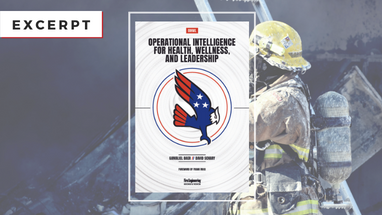Apr 12th 2024
Excerpt: Operational Intelligence for Health, Wellness, and Leadership
Micro: You and The Cell
Your body began as one cell, and that cell divided over and over again until you ended up with the trillions of cells that make your body. Each cell contains DNA, a genetic instruction guide allowing it to contribute to an organ, which contributes to a system, which allows your body to function as a whole. What you choose to do with your body will influence each system in your body, which influences your organs, which influences your cells. There is a constant, two-way feedback loop between the cell (micro) and you (macro).
Physical wellness, mental wellness, and nutritional wellness all affect the systems, organs, and cells in your body. There is mounting research on how each of these activities plays a role in cardiovascular, cellular, and neurological health. In order to reduce your risk of the Big Three, you must take control of your lifestyle.
Since the fire service began recording LODDs, the number one killer has been heart attacks, averaging roughly 50% of all LODDs. Firefighting is a stressful job, and firefighters are at times pushed to their physical limits. The reason for heart attacks in the fire service, however, cannot be solely attributed to the physical stress of the job.In fact, the large majority of firefighters who die of a heart attack on duty are dying due to preventable lifestyle-related issues.
As already mentioned, of all heart attack related LODDs, 90% occurred in firefighters that had cardiovascular disease (CVD). Lifestyle issues like hypertension, obesity, unhealthy cholesterol profiles, and diabetes mellitus are implicated as contributing factors.
Cancer
Cancer is another major health issue that affects both the general population and firefighters. It is the second leading cause of death for the general population after heart disease. You should be aware that cancer turns out to be highly preventable too. An expert team of researchers from the MD Anderson Cancer Center at the University of Texas-Houston found that 90%–95% of all cancers are from lifestyle or environmental factors, not genetics.
Separate studies have found that 44% of cancers can be attributed to preventable risk factors. However, unlike the study out of MD Anderson Cancer Center, the other studies did not compare prevalence of purely genetic cancers with lifestyle or environmental cancers.You should also know that as a firefighter you are only slightly more likely to get cancer than the general population (9% higher), and only slightly more likely to die if you get cancer (14% higher). It is not clear, though, how much of the incidence rate or mortality rate increases might be from lifestyle factors. Tobacco, poor diet, and lack of exercise were noted as common factors for firefighters.
Suicide
Suicide is the twelfth leading cause of death for all age groups in the general population. But as mentioned already, it jumps to the fifth leading cause of death for working-age Americans. You should be aware that in-depth investigational studies into suicide, called psychological autopsies, have repeatedly shown that 90% of people who die by suicide have diagnosable, and thus treatable, mental disorders. As it turns out, lifestyle has a profound impact on reducing some major mental disorders:
- Depression
- Anxiety
- Stress
- ADD/ADHD
- Addiction
All of the mental disorders listed are contributing factors to suicide.
Interestingly, a 90% preventability rate is a consistent theme across heart attack, cancer, and suicide. You can greatly reduce your risk of heart attack, cancer, and mental disorders by optimizing your wellness behaviors. Research continues to support that physical wellness, mental wellness, and nutritional wellness all influence your body’s systems, organs, and cells.
Knowing that something is good for you does not necessarily translate into doing it. For example, in one study, researchers found that almost everyone (99.6%) agreed that exercise is good for you. However, many of the study participants lacked specific knowledge about which diseases are associated with a lack of exercise. Those who knew more about how exercise reduced the risk for specific diseases exercised more often. Therefore, fire departments must go beyond simply telling firefighters that a certain behavior is good for you and do a better job of explaining the consequences of your behaviors.


